Your support to Invisible Children over the last 18 months has helped us to accomplish more this year than we ever expected — and in some cases, more than we’ve been able to share publicly. But as we close out 2015, it is important to us that we share more with the people who truly made it all possible.
Below are some of the behind-the-scenes stories and photos from the year, taken on our phones or by field staff in the midst of their work. We haven’t shared these stories publicly, both because of our own limited capacity to do so, but also because some of them include sensitive information. For that reason, we won’t be sharing much of these beyond this private blog, and we ask that you don’t either.
Thank you for your support and belief in Invisible Children’s work. We hope these short stories help you to feel as much a part of this year’s progress as we have known you to be.
The Surrender of Dominic Ongwen
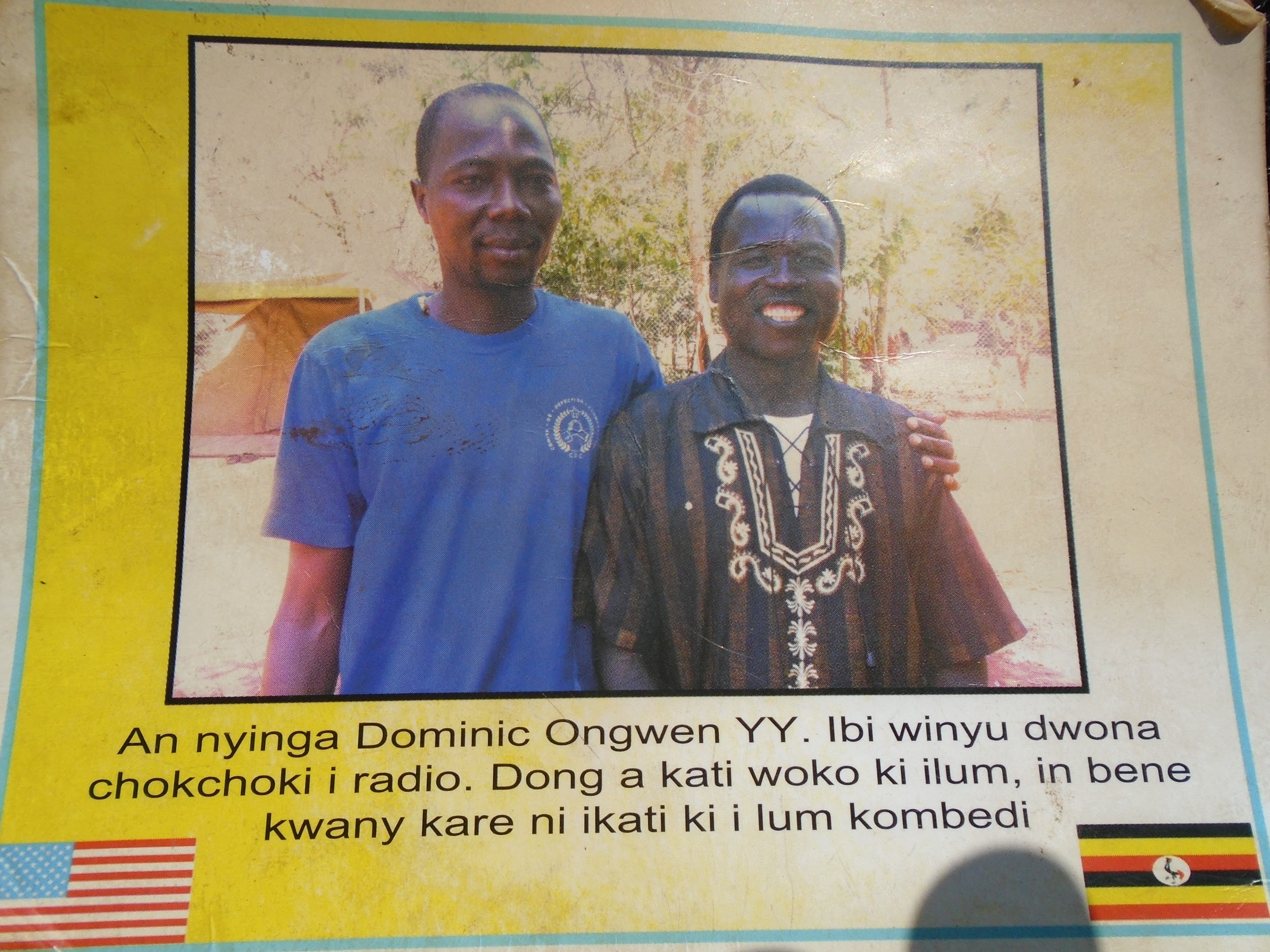
Our staff kicked off the New Year with some incredible and quite unexpected news. On January 6th, we received reports — which were later confirmed — that Dominic Ongwen (right), a senior LRA commander and ICC-indictee, had surrendered and was in the custody of U.S. military advisors in the town of Obo, Central African Republic (CAR). Ongwen’s peaceful surrender would arguably be the most significant development in counter-LRA efforts thus far.
Our staff and partners in central Africa immediately got to work, informing communities of developments through meetings and radio announcements, developing new and compelling ‘Come Home’ messages that announced Ongwen’s surrender and emphasized that he was alive and well, and preparing for a possible wave of new defections that could result from news of Ongwen.
In the “Come Home” flier pictured above, our CAR Program Officer Miller Mokpidie stands side-by-side with Ongwen. These fliers were distributed along known LRA travel routes in DRC and CAR, providing evidence to LRA fighters still in the bush that one of their respected commanders had peacefully surrendered and assuring them that if they did the same, they wouldn’t be harmed.
Expanding to Strategic New Locations
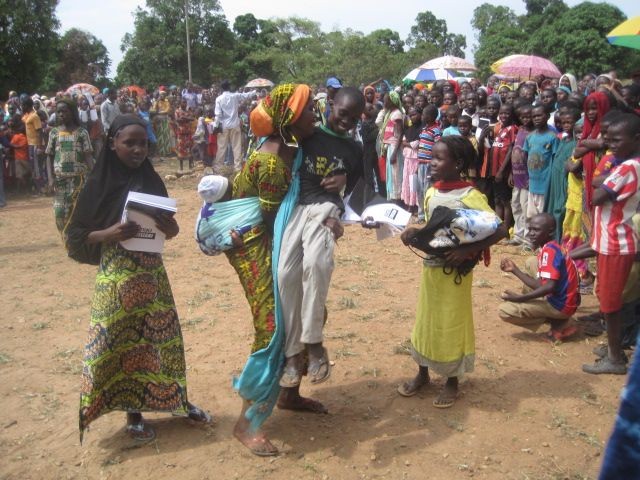
Dominic Ongwen surrendered in the remote town of Sam Ouandja in northeaster CAR. Located near CAR’s border with Sudan, Sam Ouandja is about as far from the country’s capital of Bangui as you can get and has historically been severely marginalized by the central government. As a result, the community there has received virtually no security, humanitarian, or development assistance. For years, Invisible Children has recognized the importance of Sam Ouandja in the effort to end LRA violence, given its close proximity to Kony’s known hideout in the Sudan-controlled Kafia Kingi enclave and its strategic location as an LRA rendez vous point and hub for the illicit trade of elephant ivory. We would regularly hear rumors of large LRA attacks and abductions in the Sam Ouandja area, but due to the town’s remoteness and insecurity, it was often impossible to verify those reports.
This summer, however, our staff in CAR launched its first assessment trip to Sam Ouandja to investigate the security situation and to determine the community’s openness and capacity to be partners in defection efforts and the Early Warning Network – a vital HF radio-based communication system that helps improve the protection of remote communities by enabling them to receive and report information with each other about LRA activity.
The community of Sam Ouandja was quite excited, to say the least.
The First Early Warning Call
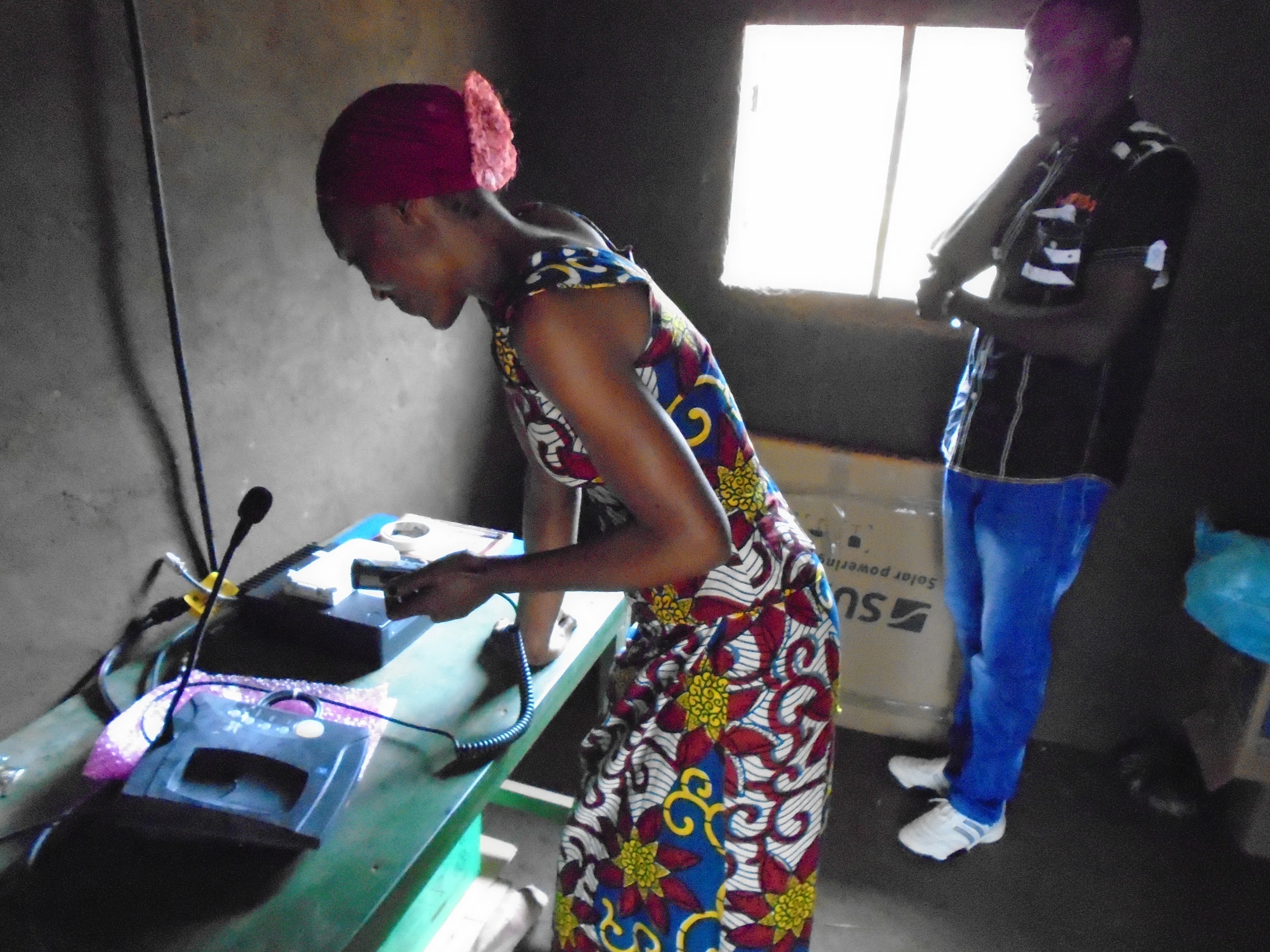
By September, the Sam Ouandja HF radio was up and running. For two months prior, our staff worked closely with the community on the construction of the radio and thorough trainings on radio maintenance, management, and best practices of reporting.
To date, more than 30 security incidents have been reported by the Sam Ouandja community through their HF radio.
“On this day, we are ready to protect our precious heritage after being abandoned. This HF radio opens us to the world for the first time and was granted by God through Invisible Children. We are ready to take care of all these investments available to us. Thank you so much.” -Boniface Odjo; Mayor, Sam Ouandja town at the radio’s inauguration ceremony
Word Travels Fast
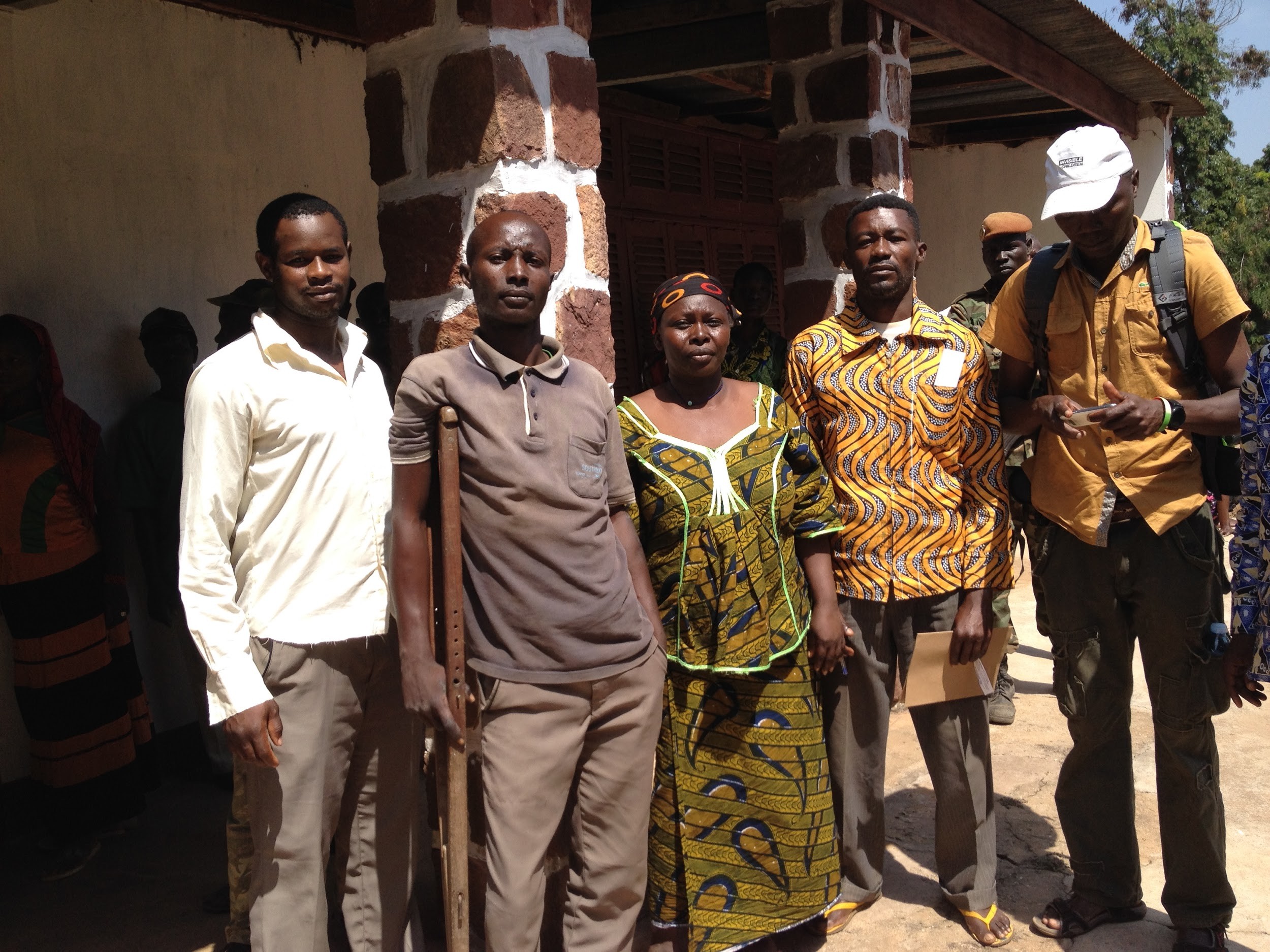
Word of Invisible Children’s EWN expansion efforts travelled fast.
Pictured above are community leaders from a very remote community called Ouadda, CAR, a town to the southwest of Sam Ouandja. On three separate occasions, the mayor of Ouadda (second from left) traveled for two days by motorbike to Sam Ouandja with the singular purpose of meeting with our staff (yes, that is Miller on the far right who cannot put down his phone) to advocate for their community’s inclusion in the Early Warning Network.
When Invisible Children made its first trip to Ouadda to assess the reports made by the mayor, we learned there had been 13 attacks within 10km of the community in the last year — attacks that were completely unknown by the outside world.
Our team moved quickly to install an HF radio there and provide the community with proper training. On December 2nd, we received the first security incident report out of the newly established HF radio in Ouadda.
Supporting Women and Children in their First Days of Freedom

Even with the ongoing threat of LRA violence and its impact on communities like Ouadda and Sam Ouandja, international support to these communities has been alarmingly low.
Since early 2014, dozens of international organizations have pulled out of LRA-affected communities, leaving very little support (if any) for the recovery of those returning from LRA captivity. Thanks to your support, however, Invisible Children has remained committed to these communities and our local partners, making us one of the only international organizations still operating in the region.
One dire need left in the wake of the departure of these organizations is the immediate support to LRA returnees in their first days and weeks of freedom, before they are reunited with their families. Recognizing the severe psychological and physical trauma that many former LRA captives experience, Invisible Children worked together with our community partners this year in establishing a Transit Center in Obo, CAR. The Center ensures women and children returnees receive holistic support in the first days and weeks of freedom — from a caring foster family trained on issues like trauma and child protection, to a “Welcome Kit” with basic necessities, to trauma counseling and social activities guided by trained professionals. It is because of your support that we’ve been able to fund these incredible community partners (who know the impact of LRA violence far better than anyone else) as they support LRA returnees in their journey of healing.
For a closer and more personal look into the Transit Center program, make sure to read this blog from our CAR Deputy Country Coordinator, Pauline, and this blog about the amazing women of AFASVER, our Transit Center partner.
The Story of Jean Bosco
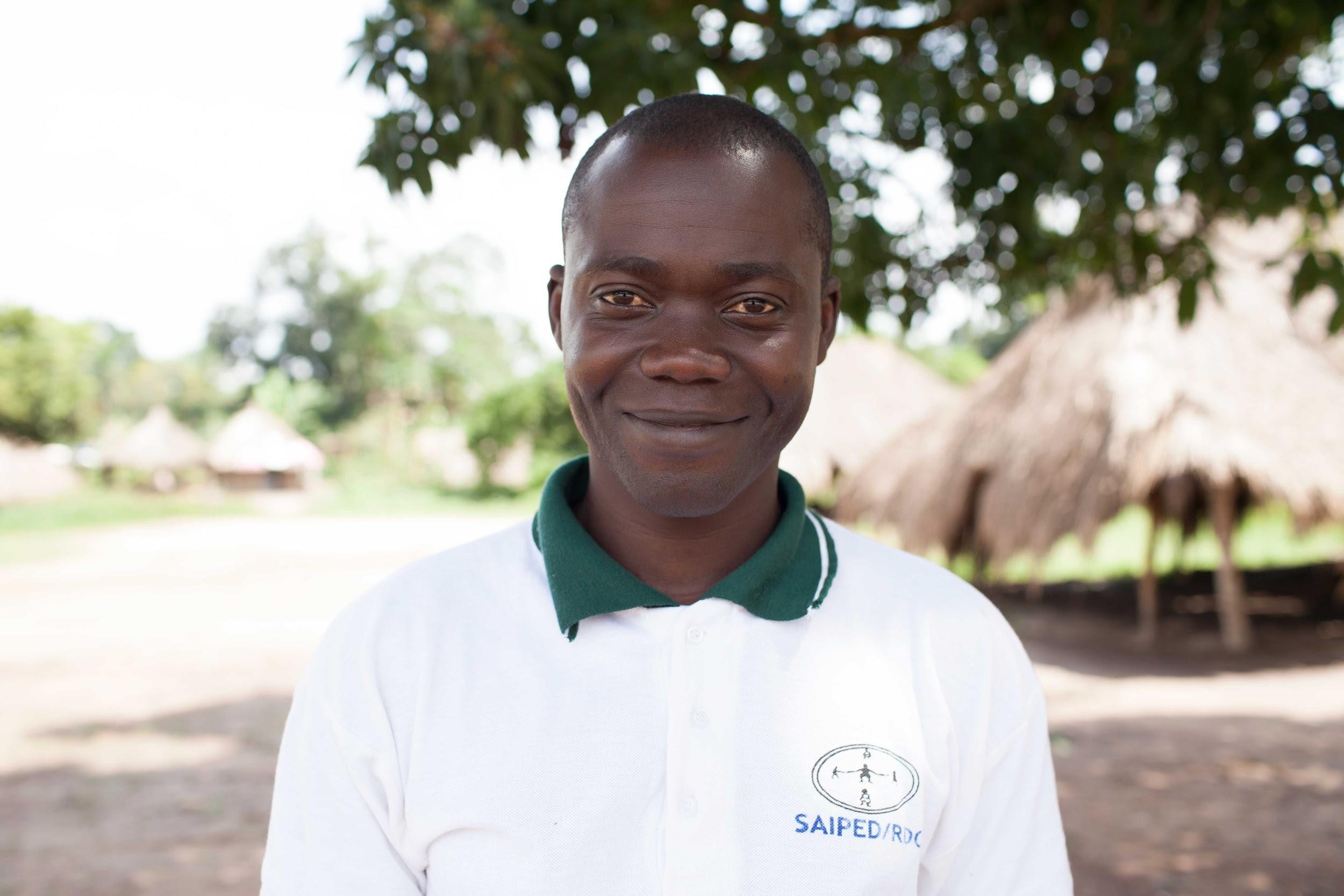
When we say that our staff and community partners in central Africa work on the front lines of the LRA conflict, we mean it. Meet Jean Bosco, the program officer for SAIPED, our partner in DRC. Since 2013, Jean Bosco has traveled from town to town in LRA-affected areas of DRC, leading workshops to train communities on how to help LRA captives peacefully and safely surrender. His job is challenging to say the least, and often very risky, but he believes deeply in his work as a way to help peacefully dismantle the LRA and help LRA-affected communities be central players in that process.
On June 23rd of this year, as Jean Bosco was traveling by road to conduct a training workshop, he was caught in an ambush by an LRA group and was shot in the arm. Our staff in DRC received news of the attack and, with the help of US and UN security personnel who deeply respect Invisible Children and SAIPED’s work, we were able to evacuate him to a regional hospital to receive the care he needed to fully recover. When news of Jean Bosco’s situation reached our staff in the U.S., several members of the Invisible Children community personally pooled funds to support him and his family during his recovery process. Today, we are so thankful to report that Jean Bosco has recovered and is doing very well.
In the wake of such an experience, one would expect Jean Bosco and his colleagues at SAIPED to be fearful of continuing their work in DRC. But their courage and determination continue to astound us and they have pressed on in their work with as much rigor as ever. With the help of our Early Warning Network, we are increasingly able to monitor the security situation in DRC to better ensure the safety of brave colleagues like Jean Bosco.
Kicking up our Defection Efforts
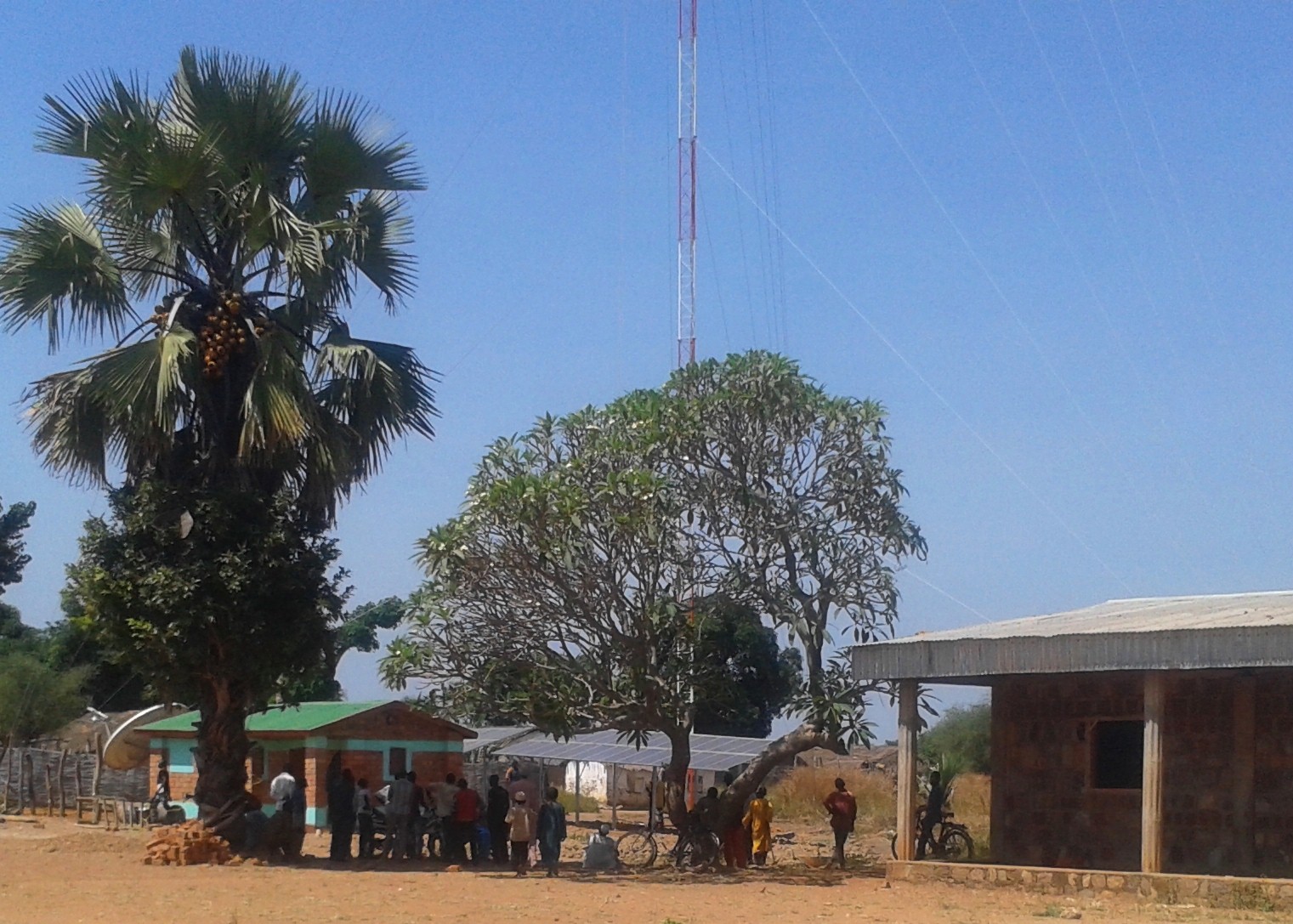
This fall, Invisible Children unexpectedly received the funding necessary to repair and build new FM radio towers in LRA-affected areas of central Africa. With the goal of completing the project in time to launch an aggressive ‘Come Home’ messaging campaign before the holidays, we worked with local communities and other partners to rapidly install new equipment, hold sensitization workshops, and conduct trainings for FM radio operators and journalists. Within a matter of weeks, five strategically-located FM radios were up and ready to broadcast.
Today, trained local journalists are broadcasting messages every day directly to LRA fighters and captives, encouraging them to peacefully surrender and come home.
Practice Makes Perfect
Above, local FM radio journalists practice for a broadcast planned for the next day.
Since the launch of this fall’s broadcast campaign, we have received two separate reports over the Early Warning Network of LRA groups asking community members for handheld FM radio receivers, in order to listen to messaging being broadcast from the new FM radio.
Celebrating Changes with our Field Staff
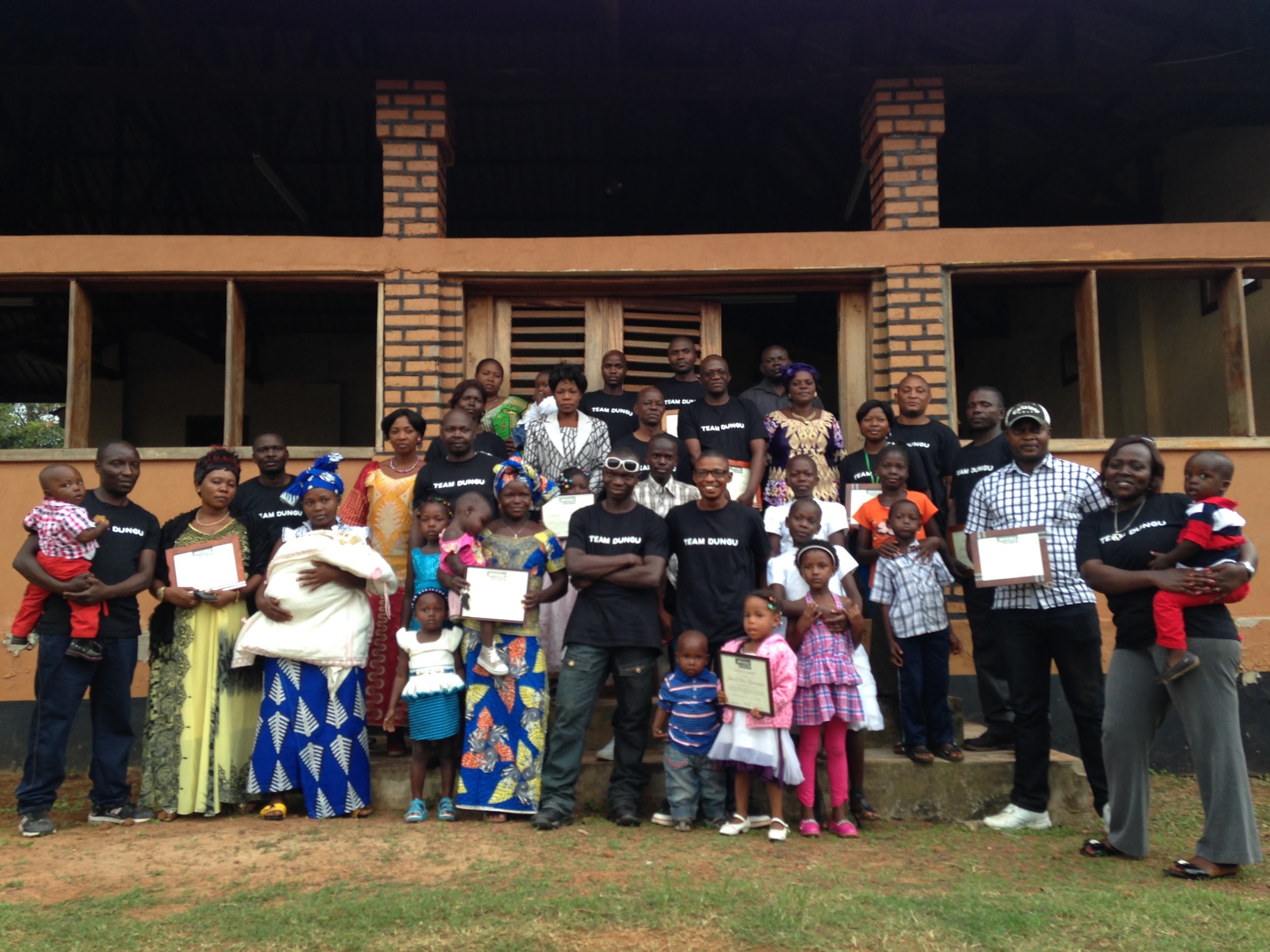
In August, we completed a six month capacity-building program to strengthen the operations and programs of our community partners in the Democratic Republic of Congo.
To celebrate, our DRC staff and their families came together for speeches, food, and – of course – dancing. The event was truly encouraging, while also bittersweet. On the one hand, we were celebrating the transfer of even more program ownership and leadership directly into the hands of the community leaders who run them. On the other, a team that had grown to be a close-knit family was changing significantly. Many formerly Invisible Children staff positions – although still supported by us – would be transferred under the leadership of our partner organizations.
Today, Invisible Children continues to provide financial support and training to our partners in DRC as we work hand-in-hand to develop program plans that will best support communities affected by violence and insecurity. Through 2016 we will keep up this longstanding partnership with community leaders, thanks to your support.
In 2016, We Want To Do More
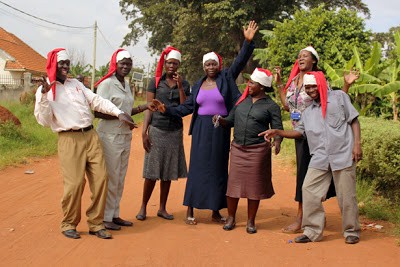
If you are still considering any last minute, tax-deductible donations in 2015, we hope you continue to consider Invisible Children.
To donate once again to the work of Invisible Children and our partners, click here.
With your support we’re excited to continue supporting LRA-affected communities in their pursuit of peace and security.
Think people should hear about this?